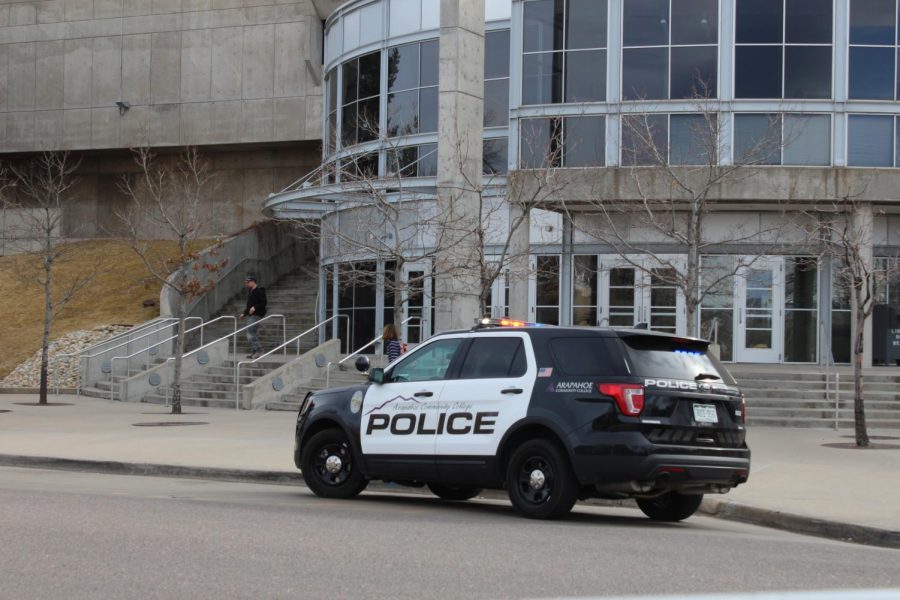Chief Joseph Morris Hosts Open Forum
Image via Serena Montoya
Pinnacle File Photo of ACC’s Littleton Campus.
George Floyd died at the hands of law enforcement on May 25, 2020. His death rippled through the nation and resurfaced concerns about social and racial injustice. Law enforcement is being scrutinized and dissected in an effort to understand and improve relationships between citizens and officers. On Sept. 21, 2020 Arapahoe Community College Police Chief, Joseph Morris, responded to the nation’s concerns about law enforcement and calls for police reform by hosting an open forum Zoom meeting and inviting students and staff to attend. The goal was to reach out to students and staff at ACC and provide information about the department, their training policies and procedures, and the department’s philosophy. Chief Morris wanted to address any questions or concerns the community might have.
Chief Morris has been at Arapahoe Community College since 2012. In 2013 he became Chief of Police. The department has twelve sworn officers and has been in existence since 1980.
ACC police department receives about 8,000 calls per year. The calls are typically to help people get to locations, unlock car doors, and respond to accidents on campus. The department operates under an MOU with the City of Littleton, so they also manage public streets; responding to accidents. However, they do not manage parking.
Dr. Diane Doyle, President of Arapahoe Community College, posed the first question asking Chief Morris to discuss the training ACC’s officers go through. Chief Morris explained training is conducted through the Law Enforcement Academy. Police Officers hired at the department enter a The Field Training Program which is 12 to 14 weeks. Training includes learning policy, protocols, and standard operating procedures as well as learning the geography of all campuses. The officers learn what the community-based policing model is. All training includes use of force, training with firearms and extensive training in less lethal weapons including pepper spray. The police training facility is in Highlands Ranch.
All commissioned officers are required by the Colorado Peace Officers Standards and Training to complete a minimum of 24 hours of training. 12 of those are know as perishable skills, such as the use of force, arrest control/de-escalation, emergency vehicle operations, training with less-lethal weapons/devices. Some of that training is taking place online due to Covid-19 restrictions, however, the department tries to do as much in-house training as possible. The officers are trained to work with the public to understand the needs of the communities at ACC. Although 24 hours of training is required to keep post certification Chief Morris estimates their officers complete 50-60 hours. According to Chief Morris, over 90 percent of the department is certified in Crisis Intervention Training. The training techniques educate and prepare officers to respond, interact, and assist individuals experiencing a crisis.
The Law Enforcement Academy at Arapahoe Community College currently has 30 recruits. “It’s actually really surprised me, I’m not sure what’s going on we actually have a waiting list for the academy this last time and most of the agencies in Colorado are doing very well as far as numbers so it’s been kind of surprising due to the environment towards law enforcement right now,” said David Bruce, Director, Law Enforcement Academy at Arapahoe Community College.
“Community policing really took a hold in the early 80’s and it’s solid,” said Chief Morris. The Community Policing philosophy is the central cornerstone of the department and positive interactions with students, staff, and visitors are part of that goal. So, it’s really outcome-based policing at the very end of that if you look at that. The outcome needs to be positive”.
A question asked was about the types of training the officers have to deal with mental health or substance abuse issues. Chief Morris said the officers have crisis training specific to officer conduct, mental distress, and addiction issues. Officers are trained to interact in a positive way with people and work to defuse situations by avoiding words that can “elevate” the situation. The officers are trained how to talk to people and to get an understanding of what a person is experiencing or going through. “Social work is a part of what we do, we do not arrest our way out of things,” said Chief Morris. According to Chief Morris, drugs and narcotics use is on the rise nationally. Some of the department training is in the use of Narcan, (nasal spray for the treatment of known or suspected opioid overdose) for use with people that use heroin an opioids.
David Bruce discussed how often the curriculum is reviewed and who is responsible for reviewing it. There are currently three committees that review the curriculum: POST, the Academy;, and the Colorado Community College System.
In response to a question about what the department has in terms of checks and balances in place to be sure officers are operating without bias, Chief Morris said they have bias training several times throughout the year. Training includes making people of different demographics feel comfortable, learning to maintain a professional demeanor, and being approachable.
When asked why police should be at colleges and why ACC should have a police department, Chief Morris responded by explaining that officers in a college have a higher level of training to interact with students and be able to identify a problem or be of assistance. Chief Morris said, “It is definitely not a retirement job, it’s not a job for everyone.” Training is stronger, people have to be the right fit to make students or anyone coming to the campus comfortable. “We can react to situations and threats very effectively,” said Morris.
There was some concern based around the fact that folks with disabilities my not hear or understand some situations, Chief Morris said their officers have been through autism training to recognize someone on if an individual on the autism spectrum may be having an issue. It is imperative that officers understand and identify with students that have disabilities. The officers are trained to help and if necessary get assistance from student services. Patience is key.
Chief Morris stressed that the goal is to deescalate any situation if it is tense. He defined de-escalation as “a positive outcome where everyone goes home safe or we get the help for the individual we’re are trying to help, hopefully without any use of force. De-escalation is the biggest tool we have, the last thing we want to do is be physical, it takes things down the wrong path”.
Chief Morris addressed the question about regaining trust from the black community and how they can move forward as a police department. He said distrust varies by communities. If it appears populations are targeted or ignored, we can have positive input by meeting with community leaders. He said law enforcement needs to recruit from different areas, do a better job of making people feel welcome, comfortable, and heard, and get feedback from people about what is working and what isn’t. Community policing is about being connected to the public.
Chief Morris placed emphasis on the fact that they always welcome community input and suggestions for how they can improve. He closed the meeting expressing his hope that more meetings like this will take place in the future.

Donna currently attends Arapahoe Community College where she is majoring in Journalism and Contemporary Media. She enjoys meeting new people and embraces the opportunity to learn about their lives and share their stories. She is passionate...








